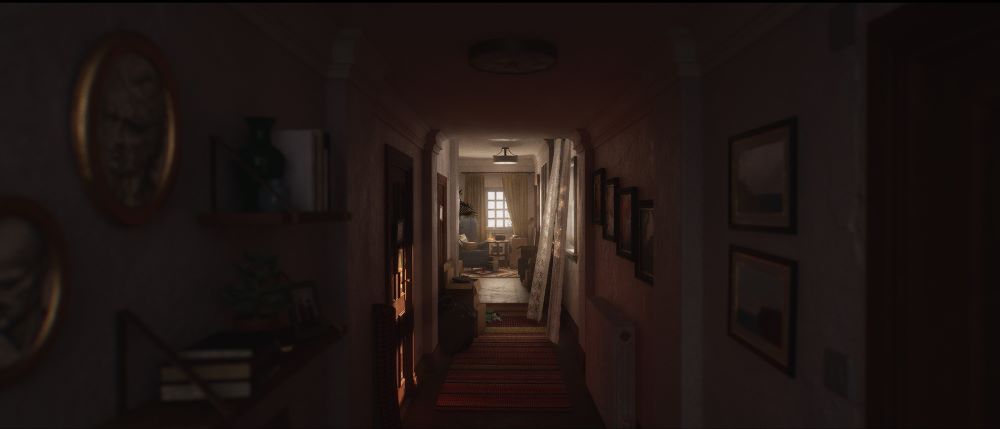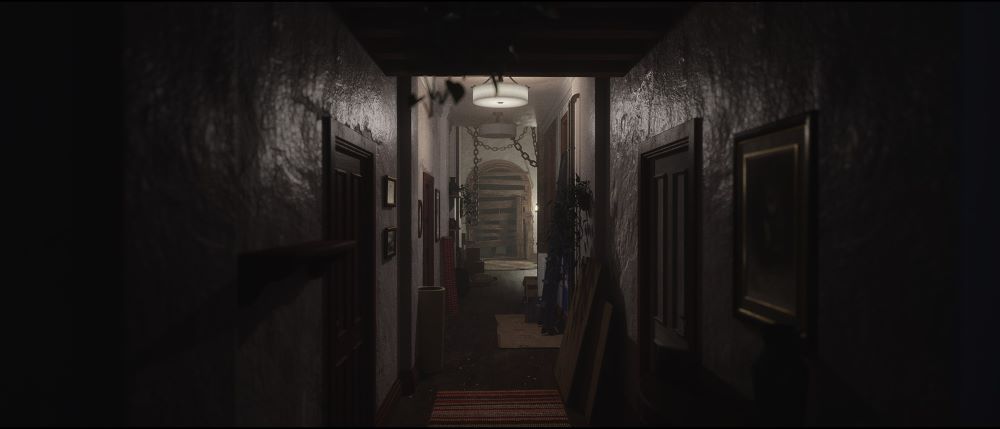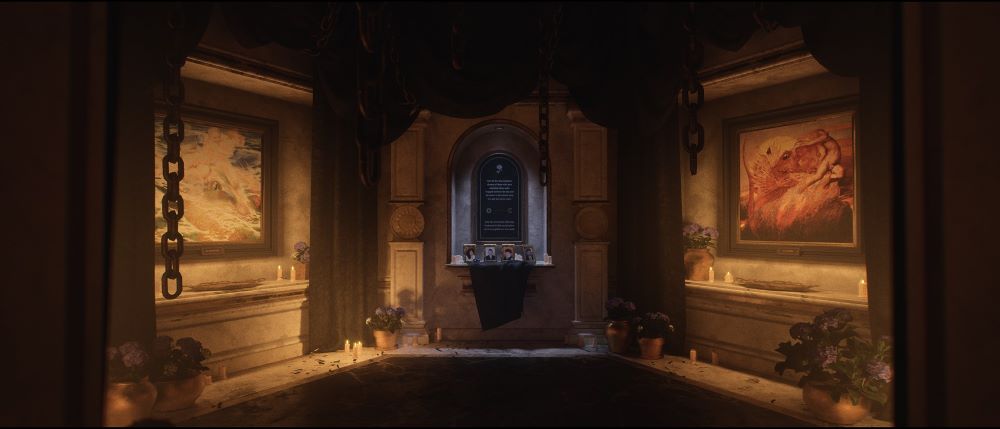Our review of Luto, developed by Broken Bird Games. Available now for PS5 (reviewed), Xbox X/S, and Windows/Steam/Epic Store.

WHAT IS IT?
A metatextual psychological horror game, with windows that break and fourth walls that shatter.
IS IT GOOD?
It’s brilliantly unsettling.
WHO SHOULD PLAY IT?
Hideo Kojima.

PRETTY TERRIFYING
As we’ve written before, the surprise release and even more surprising delisting of Guillermo del Toro/Hideo Kojima collaboration P.T. in 2014 sent shockwaves across the gaming industry, shockwaves which are still being felt today. Rare enough to get a high-profile filmmaker working in this space, rarer still are those times when a game (well, in this case, a “playable teaser”) appears, is met with widespread critical acclaim, and then is ruthlessly withdrawn by corporate overlords due to confusingly obscure “business priorities”.
P.T., which to many gamers remains the apotheosis of the modern haunted house story, may be dead. But its spirit lives on in the countless remakes/homages/ripoffs which have proliferated since its release, ranging from the mediocre to the spooky to the genuinely terrifying.
Spanish indie horror title Luto – the title roughly translates to “mourning” or “grief” – is only the latest inheritor of the P.T. tradition, and it’s a good one, with a genuinely unsettling atmosphere, some intriguing ideas, and an unexpected connection to another famously offbeat mid-2010s release. That’s right, in addition to riffing on P.T., Luto also borrows heavily from a game whose core design is itself built around iteration and recursion.
Welcome, gamers, to Luto, the Stanley Parable of horror games.

SIEMPRE ASUSTADO
The first hour or so of Broken Bird’s Luto is slow, cliché, and not particularly scary. But it’s also misleading, and one of the great delights of Luto is that, once you get past that opening hour, it reveals itself to be something far more fascinating and way weirder.
Like many a P.T.-alike before it, Luto has your basic contemporary haunted setup: gone are the creaky old Victorian manors of horror past, players instead waking up in a seemingly bland middle-class house, where the biggest jump scare is a well-placed automated air freshener. (No, really.)
But Luto also has its narrator, one of those cocksure, slightly condescending British male types who, as in The Stanley Parable, obviously takes great delight in the fact this game keeps looping around on itself. As in, you start the game standing in front of a cracked bathroom mirror, make your way downstairs, head out the front door, only for the screen to go dark and everything starts all over again. Several more cycles of this, and really the only identifiable difference is that the narrator, initially just annoying, starts to take on a more sinister aspect.
Eventually – and this is where it pays to hold out, even if you find the opening sequence grating – something does shift, this strange P.T./Stanley Parable hybrid finally hinting at the unusual directions it’s going to be heading in. (Which, incidentally, includes some helpful Spanish language lessons courtesy this Spanish government-funded, Canary Islands-developed game.)

PART-TIME
Luto is an imperfect organism, not nearly frightening enough for its premise (which we won’t spoil here), too self-congratulatory about its somewhat derivative ideas, which play in a similar metafictional space as The Stanley Parable, Eternal Darkness, or Kojima’s own fourth-wall-breaking Metal Gear series.
But it is scary, and what really elevates Luto above other recent horror experiences is its utter unpredictability. I’ve probably already said too much – and if you haven’t played The Stanley Parable, you really should check that out first – but the fun of Luto, as in any good horror game, is in constantly being slightly lost, slightly disoriented, slightly unclear about what’s going on. Even seasoned Stanley veterans will be surprised, and surely delighted, at the many and varied swerves this game takes, as its superficially banal setting reveals itself to be far more multifaceted than first appearances. (Also, way bigger, in ways that deliberately contradict basic physics.)
You know that moment in every horror film where the idiot characters voluntarily descend into the obvious murder basement? (Zach Cregger’s Barbarian was particularly adept at this.) Luto is full of those moments, and the best part is that it’s you, the player, doing the volunteering. Trust me, there will be moments in Luto where you really don’t want to turn that corner, climb that ladder – but you’ll eventually have to, and the payoff will absolutely be worth it.

LA MAYORIA VIENEN DE NOCHE
Much like Jaws or The Blair Witch Project before it, Luto benefits greatly from its limited budget, the developers smartly relying on the power of suggestion – things overheard, moments half-glimpsed – in lieu of the big obvious CGI ghoulies which become available on a larger budget.
That also means Luto has a wonderfully chosen recurring “enemy”: the dozens if not hundreds of sheet ghosts which haunt the house. Yes, sheet ghosts. As in, those Charlie Brown-like figures wearing a sheet draped over their bodies. It’s hardly a spoiler to reveal that, right from the opening, these ghostlike figures are present, eerily placed throughout the house. Quietly amusing at first, but as the game wears on, and as the ghosts begin to, you know, move, the line between funny and scary blurs further and further. Again, the power of the unseen does a lot of work here: thanks to some highly realistic movement animation, and the fact you never really see what’s underneath the sheets, their presence remains creepy and unnerving throughout.
The sheet ghosts are also, surely, a nod to the recent David Lowery film A Ghost Story (2021), the meditative drama featuring Casey Affleck as a dude with a sheet draped over his body. As it happens, Luto is overflowing with horror film references, from the classic to the modern, and horror fans will have a great time spotting the easter eggs, references, or copyright-lapsed movies that appear in this world.
Ultimately, where Luto falters is in its inability to wrap up the many fascinating threads it unspools for itself. With too many red herrings, too many feints which seem to suggest one thing, only to later contradict it with something else, players are likely to find the conclusion unsatisfying. Especially when the tension between the Stanley Parable and P.T. of it all reaches its breaking point, and the game proves ill-equipped to reconcile these two very different sides of itself.
The journey to getting there, however, is absolutely worth it. Luto is compelling, occasionally frightening, and completely deserving to be experienced by horror fans.
***
Final score: 8/10 boundary breaks
Visit the official website for Luto here.



